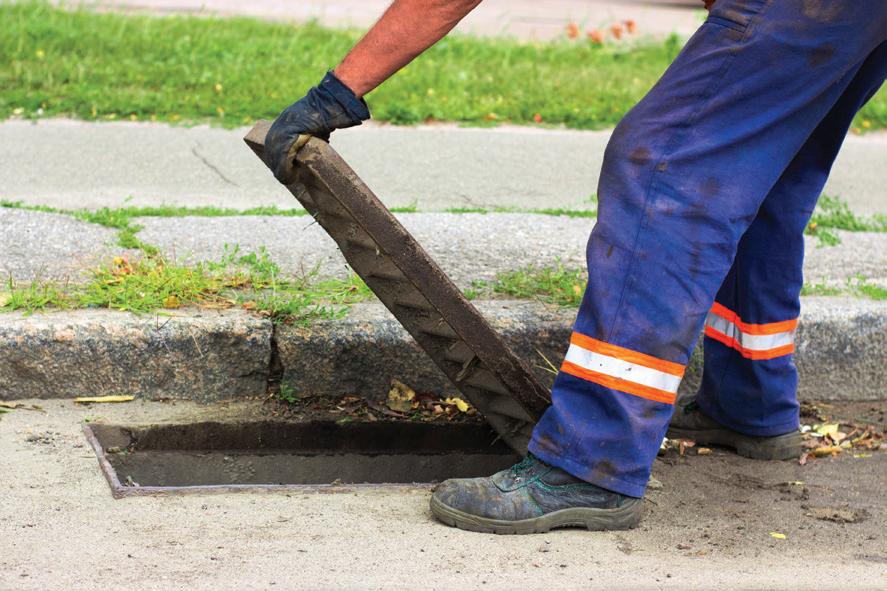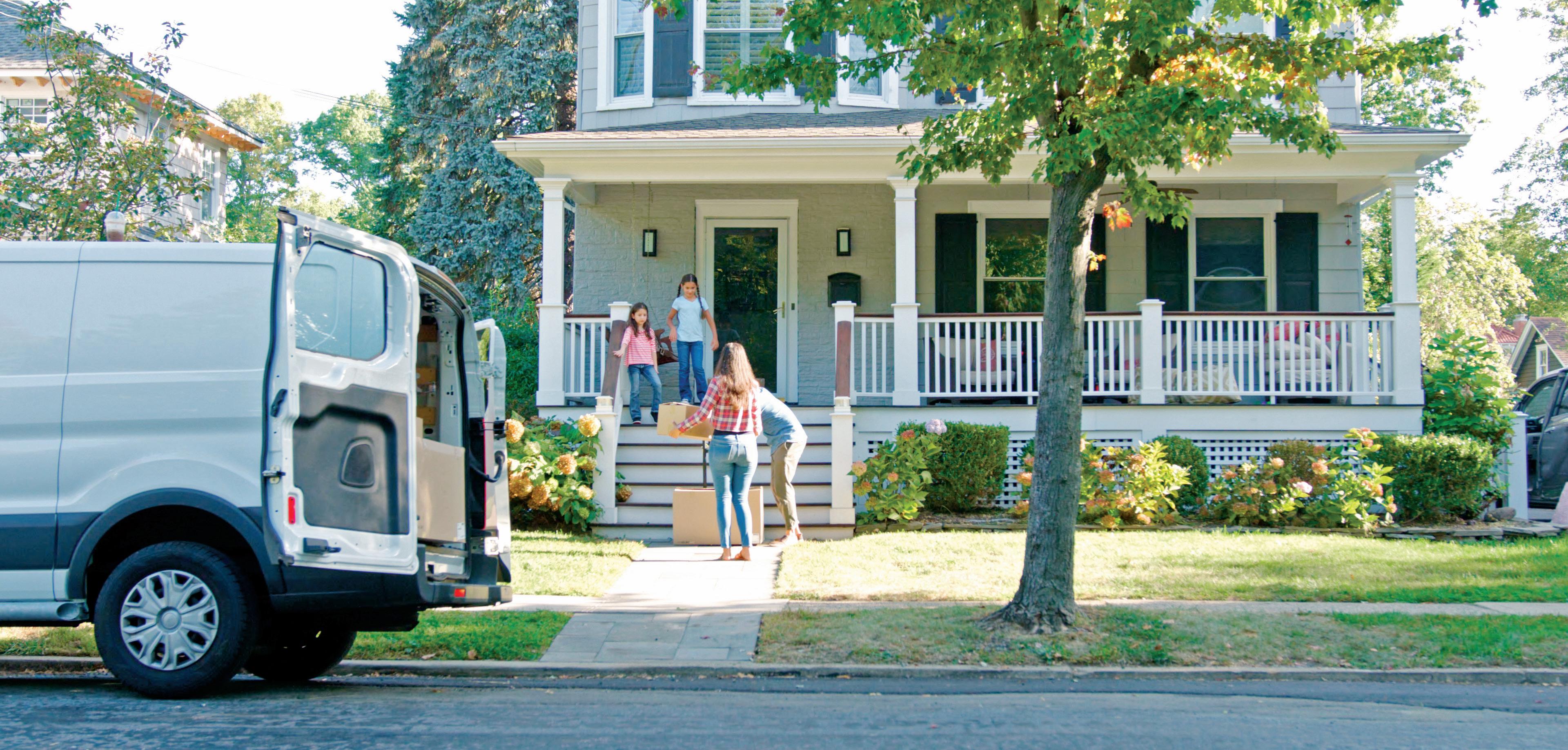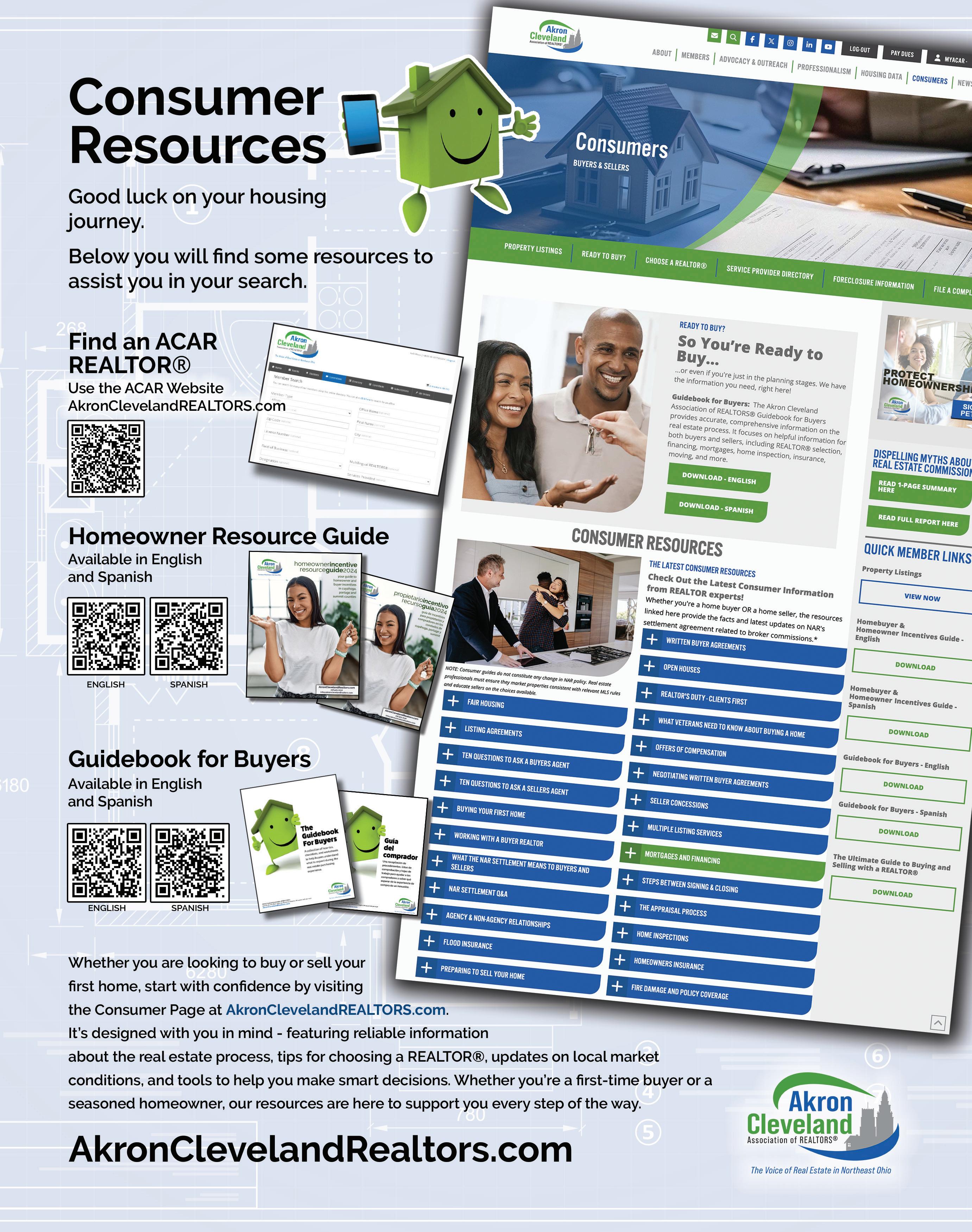HOME OWNERSHIPThe Path to

How REALTORS ® Champion the American Dream


The Cleveland area is known for many attributes that appeal to homebuyers — a cost of living that is lower than in many areas of the country, a wide variety of housing styles and neighborhoods, access to green spaces and parks and a Midwest mentality that is known for its friendliness and hometown pride.
But there is historic practice involving residential real estate transactions that casts a shadow over the region, according to the Akron Cleveland Association of REALTORS® (ACAR), which has approximately 6,000 members. Point of Sale (POS) transactions mandated by some municipalities require homeowners to obtain inspections of a home’s exterior, interior or both, and demand the homeowner (or the home buyer) make necessary and often costly repairs before the property can be sold and ownership legally changed.
Three major reports have concluded that POS inspections are detrimental, and several court cases have found portions of the practice to be illegal. The most recent comprehensive study, conducted
by the Alpaugh Family Economics Center, University of Cincinnati, was released earlier this year. The independent report echoes what ACAR has directly observed: POS inspections are “a barrier to home ownership, hindering housing transactions, reducing home values and limiting wealthbuilding opportunities for homeowners.”
Among the report’s findings for municipalities with POS inspections:
• Significantly higher vacancy rates (24.9% versus 7.1% in non-POS areas).
• Slower housing sales, with transaction rates per 1,000 households averaging 45.6 in POS areas versus 52.0 in non-POS areas.
• Homes in POS municipalities are sold for an average of 13% less than similar properties in areas without POS requirements. The decrease in sale prices reduces homeowners’ equity, limiting their ability to build wealth through property ownership.
• POS inspection communities experience higher unemployment rates and lower educational attainment, exacerbating local economic challenges.
Bottom line, according to the Economics Center: “This study’s results have found that POS ordinances function similarly to an implicit tax, as markets with POS ordinances have lower sale prices and decreased velocity of home transactions compared to non-POS communities. These impacts additionally further burden low-income homeowners living in neighborhoods with POS ordinances.”
(The entire report can be read at akronclevelandrealtors.com/news)
“ACAR is opposed to POS inspections. Instead, we support and encourage our communities to employ a systematic exterior inspection of all the properties in their jurisdiction,” says Jamie McMillen, ACAR’s Vice President of Advocacy. “That way you are not just inspecting houses that are for sale or rent. It is a more equitable and efficient means to make sure all neighborhoods are being maintained.”
Seth Task, a member of ACAR’s Legislative Committee, has an extensive background of involvement in the National Association of REALTORS® (NAR) Extended Leadership
team for Public and Federal Issues. Except for a few pockets of municipalities in Illinois and Minnesota, Task says some Cleveland area municipalities are unfortunately unique in the country for insisting on POS inspections.
“ACAR did not pay for this recent, independent report to prove POS inspections were good or bad,” says Task. “We investigate policies and systems of governments to determine whether they are effective for homeownership. If the report came back saying POS inspections are good for a community, then we would have advocated for them. But we follow the logic.”
Task considers POS inspections to be discriminatory because, for one reason, they can eliminate potential home buyers as the amount of escrow some municipalities require to hold repair deposits may be prohibitive. The history of the POS inspection can be also traced to redlining and racist practices in past decades.
“The inspections also do not accomplish the goals they are set out to do,” says Task, noting many of those who more recently adopted the policy thought it would maintain the integrity of the community and housing stock. “Some people think we are trying to destroy their community and that we don’t want what is best for that community. Nothing could be farther from the truth.”
Task also pointed out that several communities have lost legal cases after they were taken to court for their POS inspections. He further believes required interior POS inspections can be “considered an illegal search.”
“It’s amazing to me that there are still cities that think it is OK to come inside a property owner’s property — whether that is the owner/occupant or an investor — and search for violations,” says Task. “Also, in reality, it would be much smarter and easier to facilitate an exterior inspection in a systematic amount of years. That way a municipality knows how many houses there are, and how many you have to inspect every month.”
Task also says there are practical and feasible ways to help homeowners who perhaps cannot afford those systematic inspections or repairs. Encouraging residents to apply for repair funding that helps prevent blight and encourage property maintenance is an important step, he says.
Sometimes it takes a face to really illustrate the damage a POS inspection requirement can do. In 2022, Northeast Ohio homeowner and banker Jason McGee was looking for a house to purchase after a divorce. McGee has owned a number of houses in his lifetime, enjoyed renovating several, and is knowledgeable and enthusiastic about architecture and design.
He found a mid-century modern house on the market in Shaker Heights that had only one owner and whose original style was intact. McGee was impressed with the home’s glass front exterior, ceiling-to-floor fireplace, classic covered walkway to the garage and other important mid-century elements.
“These kinds of properties don’t come up for sale a lot and when they do, they tend to be overpriced,” says McGee, who offered a $150,000 down payment. “I knew some

of the cedar shake shingles on the roof had to be repaired and there were a few aesthetic things I was going to change on the inside to match my preferences. I had done renovations before and could do a lot of the work myself.”
The transaction was nearing its closing when the city presented McGee with four pages of POS violations and a demand for 150% of the repair costs to be placed in escrow. An independent roofer estimated repairs at about $26,000, but the city insisted that it would only accept its $60,000 to $80,000 estimate for a new roof it wanted. McGee found himself not only looking at that cost but the cost of other repairs.
“I understand escrow. I understand the city not wanting someone to come in and mess up an area. But their insistence of not accepting the roof repair, making the escrow amount so high, made no sense. Shaker Heights may be a great place to live, but I will never buy a house there,” says McGee, who did purchase a home in Cleveland Heights, after also having to rent an apartment at a high rate for several months because he needed to vacate his former home by a certain date but POS complications caused delays in his moving.
“Jason’s situation was heartbreaking and stressful. It didn’t have to be that way,” says REALTOR® Katy Boscia with Berkshire Hathaway HomeServices Professional Realty, who acted as his agent.
Boscia, vice chair of ACAR’s Legislative Committee, says POS inspections with escrow requirements are especially hard on first-time homebuyers or those with FHA Loans where cash flow can be tight. But that type of procedure “can also open the door” to out-of-town businesses, flippers, absentee landlords and investors with plenty of cash on hand, she says. Boscia also encourages homebuyers to connect with real estate professionals who are familiar with a city’s standpoint on POS inspections.
ACAR did not pay for this recent, independent report to prove POS inspections were good or bad. We investigate policies and systems of governments to determine whether they are effective for homeownership.
—Seth Task
How cities without POS inspections maintain housing and sales

The Alpaugh Family Economics Center’s POS inspection study commissioned by ACAR supports the idea that there are better ways to keep a community’s housing stock strong and neighborhoods viable without the negatives of POS inspections.
“Those communities still with POS inspections have to understand why cities like Beachwood and Lakewood have extremely low inventory and excellent housing value,” says Task, noting the attraction of those cities to homeowners and home buyers. “They have better systems of protecting their housing stock from blight than POS inspections.”
In general, Ohio has no uniform real estate housing inspection ordinances, mandatory or not. Cities without POS inspections frequently rely on systematic inspections or examining very specific concerns such as sidewalks or sewers. For many cities, those requirements work well, according to city data and ACAR.
THE CITY OF PARMA
Parma Mayor Tim DeGeeter and city officials rely on ongoing housing inspections rather than POS requirements.
“The city of Parma’s property maintenance approach targets residential and commercial properties that require inspection due to complaints, inspector observed violations or changes in property use. By addressing violations as they arise, rather
than waiting for a transaction, we avoid deferred maintenance and the associated decline in neighborhood appearance and safety,” according to DeGeeter. “Further, we perform mandatory annual inspections of all rental properties.”
DeGeeter notes that his city’s model “allocates inspection staff based on need rather than significantly increasing city spending to inspect every property sale regardless of risk or condition.”
He adds, “We’ve made a deliberate policy choice designed to maintain community housing standards and resident fairness, provide effective code enforcement, protect tenants and responsibly steward taxpayer dollars.”
THE CITY OF CUYAHOGA FALLS
Cuyahoga Falls in Summit County does not have a mandatory POS inspection requirement, according to Mayor Don Walters. But what it does have generates “amazing results.”
“I believe it is the only program of its kind in the country,” says Walters, mayor since 2014, describing the city’s innovative plan to maintain the two distinct sewer systems in a city — storm and sanitary.
“Our goal is to keep rainwater out of the sanitary sewer system. If not, we must pay to treat rainwater at the sewage treatment plant when it rains and the city sewer can get overloaded and back up into people’s basements as well as creeks and streams,” says
Walters. “Every real estate agent involved in a sale must notify the buyer and seller of the availability of a free sanitary sewer inspection from the home to the street.”
The city does its own inspections with a drain camera. If the system fails, it must be replaced or repaired or the city assesses a large surcharge on every new sewer bill moving forward. Direct connections of footer drains, downspouts and the possibility of cracked pipes or bad joints are noted.
The city of Cleveland also has no general POS inspection requirements. However, in 2024 the city passed an ordinance requiring vacant homes in the city to be registered and have exterior inspections before ownership transfer. In addition, Cleveland City Councilman Kris Harsh, Ward 13, sends informal letters to those with deteriorating homes asking them to make repairs, an action he says has gotten positive results.



“Any time we see one of our communities making homeownership more attainable to any family or household that chooses that path, that’s a good thing,” says Jamie McMillen, ACAR’s Vice President of Advocacy.
Changes, updates or complete elimination of POS inspections are “one tool in the toolbox to make that a reality,” according to McMillen. But she points out rollbacks on cities’ POS policies are not a “one-size-fits-all” for Northeast Ohio communities.
“What Maple Heights has done is a little different from what Euclid, Berea or Shaker Heights has done. And, of course, we always hope there will be more rollbacks in our communities,” says McMillen. “But each community needs to move at its own pace to be comfortable and to see if the changes are working. If they aren’t working, then we need to tweak and see what adjustments are needed to make homeownership attainable.
“But when I talk to mayors like Annette Blackwell of Maple Heights or Kirsten Holzheimer Gail of Euclid, the consensus seems to be that rollbacks they have put in place are helping. I take comfort that what they are seeing matches what ACAR has been advocating for years.”
CITY OF MAPLE HEIGHTS
Annette Blackwell has been mayor of Maple Heights since 2016 when she inherited a city in financial crisis. Armed with a


